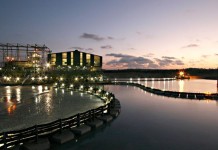
[miningmx.com] — ESKOM will continue to allow BHP Billiton to produce
aluminium with subsidised electricity, even if winter conditions make load shedding
necessary.
“We have a contract with Billiton, and we will honour the stipulations of the
contract,’ Eskom CEO Brian Dames said in response to a question of whether he,
like his predecessor, would allow Billiton’s two aluminium smelters to continue with
production – even if the pressure on the national power grid became so intense that
load shedding would again have to be introduced.
The power grid is under pressure at this point in time.
During the previous load-shedding periods and the three days in January 2008 when
Eskom forced the entire mining industry to a halt, Billiton was allowed to continue
producing aluminium unhindered.
All the necessary raw materials are imported, and 95% of the production is
exported.
The National Energy Regulator (Nersa) later calculated that the interruptions cost
the country about R50bn in lost economic activity that year.
Billiton’s two smelters, Hillside in Richards Bay and Mozal in Maputo, consume 1,945
MW of Eskom’s total 39,000 MW basic generating capacity. In terms of the contract
of provision, they may only be turned off for a couple of hours a week when there
are electricity shortages on the grid. Sources say this is at most two hours a week.
In addition, the aluminium that Billiton now produces at its two plants is smelted at
a loss. The two smelters produce about one million tonnes of aluminium a year, but
their profitability has fallen sharply over the past two years due to surplus
production in China.
In the half-year to end-December, the two smelters recorded a $67m loss, partly as
a result of input prices.
In this period, the average aluminium price was $2,391 per tonne, and since the
beginning of the year the average price on the London Metals Exchange was $246
per tonne lower, at $2,145 per tonne. On Friday it fell to $1,954 per tonne – the
lowest level since July 2010. There’s little doubt that the losses for the full year will
be even greater.
The price at which Billiton buys electricity from Eskom is kept secret and is the
subject of a court case between Media24, Eskom and Billiton.
The best indication of the price was contained in an Eskom operating report leaked
to Pieter van Dalen, then DA public enterprises spokesman, in 2010. According to
that report, Hillside paid 15c per kilowatt-hour (kWh) for electricity in 2009 and
Mozal 13c per kWh.
Eskom’s average rate at present is 50.3c per kWh, and its operating cost is 41.3c.
Eskom furthermore spent R1.8bn in the first five months of this year buying
electricity back from ferrochrome smelters, which are just as electricity-intensive as
aluminium smelters. This gave Eskom the opportunity to catch up with arrears
maintenance work.
– Sake24









